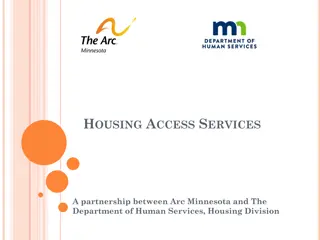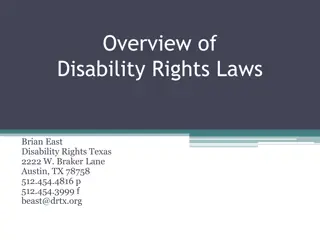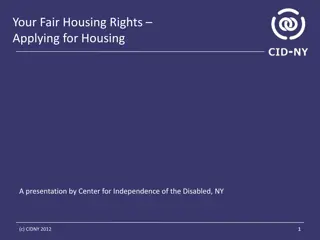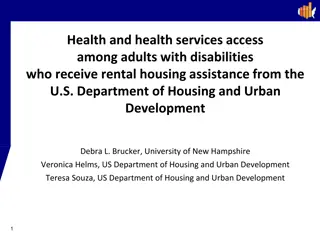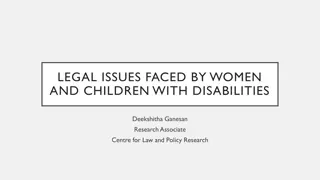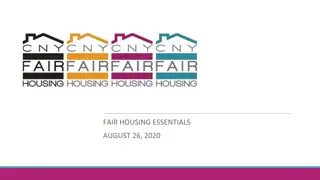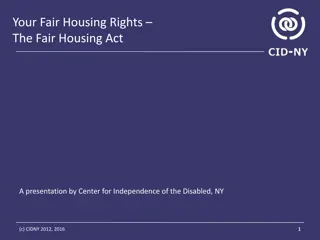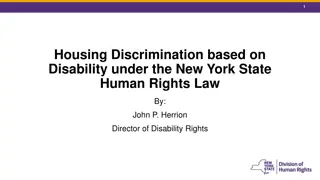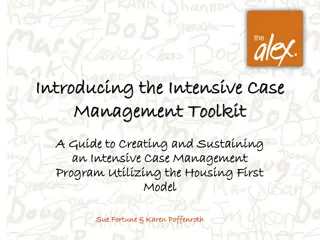Understanding Housing Rights for People with Disabilities under NY State Human Rights Law
This informative guide covers the provisions of the New York State Human Rights Law (NYSHRL) that protect individuals with disabilities from housing discrimination. It explains who is covered by the law, what actions are prohibited, the obligation to reasonably accommodate, covered housing providers, exceptions, and definitions of disability under NYSHRL.
Download Presentation

Please find below an Image/Link to download the presentation.
The content on the website is provided AS IS for your information and personal use only. It may not be sold, licensed, or shared on other websites without obtaining consent from the author. Download presentation by click this link. If you encounter any issues during the download, it is possible that the publisher has removed the file from their server.
E N D
Presentation Transcript
Housing Rights for People with Disabilities under the New York State Human Rights Law
2 What will we cover today? The New York State Human Rights Law (NYSHRL) provisions that protect persons with disabilities from housing discrimination. Who are covered housing providers? Who is protected by the law? What is prohibited by the law? Obligation to Reasonably Accommodate. How does the New York State Division of Human Rights (DHR) enforce these provisions?
3 Covered Housing Providers Owners Private or publicly-assisted Lessees or sub-lessees Rentals Managing agents Co-ops and condos Real estate brokers or agents sales of single-family homes, commercial space, etc. Other persons having the right to sell, rent or lease a housing accommodation Any agent or employee of the above
4 Exceptions Owner-occupied, two-family dwellings (recent amendment) Owner-occupied room rentals Rental of all rooms to individuals of the same sex Senior citizen housing that falls under the specific exemptions in the NYSHRL, with respect to age and familial status only Religious institutions may limit to members of their religion
5 Advertising & Owner-Occupied Two- Family Dwellings Previously, owner-occupied two-unit dwellings were entirely exempt from the NYSHRL. However, there is no longer an exemption for discriminatory advertising and inquiries for rental in an owner-occupied two-unit dwelling. The law provides that engaging in discriminatory advertising or inquiries will cause an owner of such property to lose the exemption to the portions of the NYSHRL that prohibit rental discrimination or discrimination in the terms and conditions of such rental.
6 Advertising & Owner-Occupied Two- Family Dwellings Thus, not only will such owner be liable under the advertising provisions of the NYSHRL, but the law now applies in full force to such property whenever the advertising and inquiries provision is violated.
7 Definition of Disability under NYSHRL physical, mental or medical impairment resulting from anatomical, physiological, genetic or neurological conditions which prevents the exercise of a normal bodily function or is demonstrable by medically accepted clinical or laboratory diagnostic technique, or; a record of such an impairment, or; a condition regarded by others as such an impairment.
8 Definition of Disability under FHA The FHA defines disability as a substantial limitation of a major life activity. The definition of disability under the NYSHRL is more broadly construed and does not require the impairment to be substantial or affect a major life activity.
9 Prohibited Discrimination It is unlawful for housing providers to refuse to sell, rent, lease or otherwise deny any person a housing accommodation on account of disability. It is unlawful for housing providers to discriminate against any person because of disability in the terms, conditions or privileges of the sale, rental or lease of any housing accommodation.
10 Prohibited Discrimination It is unlawful to advertise, publish, or to use any form of application for the purchase, rental or lease of housing, or to make any inquiry in connection with the prospective purchase, rental or lease of housing which expresses any limitation, or discrimination as to disability.
11 Prohibited Discrimination It is unlawful for housing providers to refuse reasonable accommodations to allow a person with a disability to use and enjoy their home. It is unlawful for housing providers to retaliate against and individual because they filed a NYSHRL complaint.
12 Prohibited Discrimination & COVID If you believe that you have been discriminated against because of a perceived connection between your race, national origin, or disability and COVID-19, you can file a complaint. The NYSHRL protects individuals from discrimination based on a wide variety of personal characteristics, including race, national origin, and disability. The NYSHRL prohibits discrimination against individuals who are assumed to have been exposed to the coronavirus based on these traits.
13 Prohibited Discrimination Housing providers are prohibited from sexually harassing their tenants under the NYSHRL.
14 Retaliation It is an unlawful discriminatory practice for any person engaged in any activity to which the NYSHRL applies to retaliate against a person for: Filing a complaint, testifying or assisting in any proceeding brought under the Human Rights Law or Otherwise opposing discrimination.
15 Prohibited Discrimination by Realtors under the NYSHRL Unlawful for real estate professionals to: Discriminate in negotiating a sale or rental, including stating that a property is not available when it is; Offer or negotiate discriminatory terms, conditions or privileges of a sale or lease;
16 Prohibited Discrimination by Realtors under the NYSHRL Unlawful for real estate professionals to: Use any application, advertisement, ask any questions or make any record that expresses, directly or indirectly, any limitation or discrimination based on any protected classification Realtors are directly liable for discriminatory actions whether or not they were requested by a client.
17 Prohibited Discrimination by Realtors under the NYSHRL Steering by real estate professionals is unlawful. Steering includes guiding or making recommendations to prospective buyers or renters towards or away from particular neighborhoods, locations or school districts based on any of the other protected bases, and is a violation of the HRL.
18 Prohibited Discrimination by Realtors under the NYSHRL Liability of realtors under the NYSHRL: Real estate professionals, including brokers, salespersons, and their employees and agents can be liable under the NYSHRL; Damages can include compensation for financial and emotional harm, punitive damages, civil fines, and training and other non-monetary remedies.
19 Prohibited Discrimination by Realtors under the NYSHRL In addition, DHR works closely with the NYS Department of State, which has the responsibility of licensing real estate professionals, to ensure that the protections in New York State laws are vigorously enforced.
20 Reasonable Modifications Housing providers must permit, at the expense of a person with a disability, for reasonable modifications of existing premises occupied or to be occupied by such person if the modifications may be necessary for full enjoyment of the premises. In the case of a rental the landlord may, where it is reasonable to do so, condition permission for a modification on the renter s agreeing to restore the interior of the premises to the condition that existed before the modification, reasonable wear and tear excepted.
21 Reasonable Modifications Examples of reasonable modifications include: widening of doorways; adjusting kitchen / bath fixtures or counter heights; installation of grab bars.
22 Common Areas The NYSHRL requires covered housing providers to pay for reasonable modifications in common areas.
23 Reasonable Accommodation N.Y. Exec. Law 296.18(2) states that it shall be an unlawful discriminatory practice to, refuse to make reasonable accommodations in rules, policies, practices or services when such accommodations may be necessary to afford said person with a disability equal opportunity to use and enjoy a dwelling, including reasonable modifications to common use portions of the dwelling.
24 Reasonable Accommodations Examples of reasonable accommodations to rules, policies, practices or services include: installation of a ramp in a common area; waiving a no pet policy for a person with a disability who needs an emotional support animal; moving a person with a disability to the top of a waiting list to secure a handicap parking space that is close to, and on an accessible route to one s unit.
25 Guide, Hearing & Service Dogs Persons with disabilities that use guide, hearing or service dogs that have been professionally trained have significant protections under the NYSHRL to have the dog go where they go.
26 Emotional Support Animals - Housing Persons with disabilities that have a disability related need for an emotional support animal can ask a landlord to waive a no pet policy to allow for an emotional support animal to live with the individual. Landlord is entitled to medical documentation to support that the person has a disability and that the need for the animal is disability related.
27 Emotional Support Animals - Housing Landlords are prohibited from making restrictions on the type of animal, breed or size of dog, and from assessing fees for someone who needs an emotional support animal because of their disability.
28 2020 Amendment Reasonable Accommodation NYSHRL amended to clarify that reasonable accommodation to enable a person with a disability to use and enjoy a dwelling includes the use of an animal to alleviate the symptoms of a disability. 28
29 2021 Amendment Reasonable Accommodation Notice On March 25, 2021, the NYSHRL was amended to require the Division to promulgate regulations requiring housing providers to provide notice to all tenants and prospective tenants of their rights to request reasonable modifications and accommodations for persons with disabilities. 29
30 New Construction Newly constructed covered multi-family dwellings must be designed and constructed in accordance with the accessibility requirements found in the New York State Uniform Fire Prevention and Building Code. Newly constructed multi-family dwellings include those built for first occupancy after March 13, 1991. Multi-family dwellings are defined as, a dwelling which is occupied for permanent residence, and which is either sold, rented, or leased to be occupied as the residence of three or more families living independently of each other.
31 New Construction Requirements Include: Public use and common use portions of the dwellings are readily accessible to and usable by persons with disabilities; All doors are designed to allow passage into and within all premises and are sufficiently wide to allow passage by persons in wheelchairs; All premises within the units contain an accessible route into and through the dwelling;
32 New Construction Requirements Include: Light switches, electrical outlets, thermostats, and other environmental controls are in accessible locations; and Reinforcements in the bathroom walls to allow later installation of grab bars.
33 Protected Classes for Housing Sexual Orientation Race Familial Status Color Marital Status National Origin Military Status Creed/Religion Sex Sexual Harassment & Pregnancy Age
34 New Protections in Housing Gender Identity or Expression Lawful Source of Income Prior Arrest Records, Sealed Records, Youthful Offender Status, and Adjournments in Contemplation of Dismissal
35 Source of Income Discrimination Discrimination based on lawful source of income in housing is prohibited. This protection applies to: Sale, rental or leasing of public or private housing The terms, conditions or privileges of housing or the use of facilities or services Advertisements and applications Real estate professionals
36 What Does Source of Income Cover? Lawful Sources of Income include: Child Support Alimony or spousal maintenance Foster care subsidies Social Security benefits Federal, state or local public/housing assistance Section 8 or any other type of voucher Any other form of housing assistance regardless if paid to the tenant or to the landlord Any other form of lawful income
37 File a Complaint Visit www.dhr.ny.gov/complaint or call 1-888-392-3644 Complaints are dual-filed with HUD One year to file a complaint Alternative: file in state court within three years You cannot file with both DHR and state court
38 Information on Time Limits During the pandemic, the Governor issued Executive Orders that impacted time limits for most legal actions in New York State between March 20, 2020, and November 3, 2020. These executive orders have expired, but they may continue to impact the time you have to file a NYSHRL complaint. For example, if you believe you were the victim of discrimination between these dates, or if your one-year deadline to file your complaint would have fallen between those dates, your legal deadlines for filing a complaint was impacted by the Governor s executive orders. The DHR will assess the timeliness of any such complaint when it is filed. Please contact DHR for further information on how this may apply to your case
39 File a Complaint New complaints can be filed via mail, email, or fax. Emailed complaint forms can be sent to complaints@dhr.ny.gov. Complaints can be faxed to (718) 741-8322. DHR staff will take new complaints over the phone for any individual who requires an accommodation for a disability or who does not have access to a computer. Call (888) 392-3644. Starting July 16, 2021, complaints no longer must be notarized. Instead, a complainant may sign a declaration under penalty of perjury upon submission.
40 Complaint Filing & COVID You do not need to visit a DHR office to obtain a complaint form or file a complaint. If you would like to visit a DHR office, you can make an appointment for an in-person visit by contacting the nearest regional office. Any unvaccinated individual who is over age two and able to medically tolerate a face-covering is required to cover their nose and mouth with a mask or cloth face-covering during an in-person appointment. Personal protective equipment, such as masks and gloves, will be provided to members of the public who visit DHR offices.
41 Housing Complaint Process Investigation Determinations: Probable Cause vs. No Probable Cause Public Hearing or State Court After Public Hearing: The Commissioner s Final Order
42 Housing Complaint Process DHR has moved to electronic communications where possible. For example, investigatory conferences may be conducted by telephone.
43 Hearing Process DHR holds public hearings via a videoconference platform. DHR pre-hearing settlement conferences are scheduled and held by telephone. DHR will also hold telephonic preliminary conferences before administrative law judges to prepare cases for videoconference public hearings.
44 Remedies - Housing If the Commissioner finds that discrimination has occurred, remedies may include: Making the housing at issue available; Making reasonable accommodations and/or modifications to housing or housing policies; Compensation for mental anguish; Compensation of out-of-pocket expenses;
45 Remedies - Housing Punitive damages (housing and credit only); Civil fines up to $100,000; Requiring the housing provider and staff to attend anti- discrimination training; An order to cease the discriminatory actions or policies; Attorney s fees.
46 Contact John Herrion, Director of Disability Rights New York State Division of Human Rights One Fordham Plaza, 4th Floor Bronx, NY 10458 p: 718-741-8332 f: 718-741-8279 tty: 718-741-8300 John.Herrion@dhr.ny.gov www.dhr.ny.gov
47 Questions/Contact us Call Email Visit Follow Call our housing discrimination hotline at 1-844-862-8703 Email us at info@dhr.ny.gov Visit dhr.ny.gov Follow @NYSHumanRights on YouTube, Twitter, Facebook, Instagram, & LinkedIn







